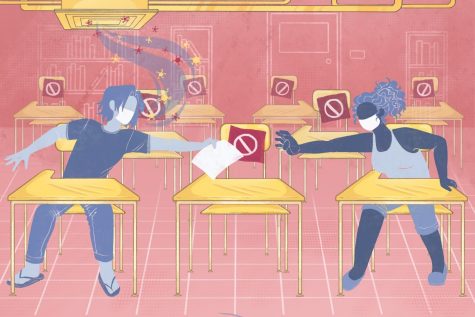College creates dashboard of active coronavirus cases, updates close-contact notification process
August 25, 2020

To monitor signs of a potential outbreak on campus, the college has developed a system to publicly log active coronavirus cases and updated its notification process to better inform those who have been in close contact with someone who tested positive.
In a Monday, Aug. 24 collegewide email, Columbia announced the logistics of contact tracing and how the college will strive to prevent the spread of the virus.
According to the email, those at the college who have been diagnosed with the coronavirus, have symptoms and are waiting for test results, or have been in close contact with someone who tested positive are required to notify Campus Safety and Security. Students should also email Student Relations.
Once a positive test result has been reported to the college, the contact tracing process begins.
Individuals who test positive will be interviewed by contact tracers at Columbia to determine when they were infectious and with whom they were in close physical contact, the email stated.
Close contacts, generally those who were within six feet of an infected individual for more than 15 minutes, will be notified via email and asked to self-quarantine for two weeks after their last exposure to the individual.
Lambrini Lukidis, associate vice president of strategic communications and external relations, said ideally, if people are following the safety guidelines by wearing a mask, staying six feet apart and frequently sanitizing, they will not be considered a close contact.
Lukidis said campus Safety and Security personnel took a John Hopkins online contact tracing training course offering a certification over the summer and will use protocol developed by the Chicago Department of Public Health to identify and inform members of the college community who may have been exposed to the coronavirus.
Ron Sodini, associate vice president of Safety and Security, was not immediately available to offer more information as of publication on Tuesday, Aug. 25.
All active cases—defined as students, employees and college visitors who test positive for the coronavirus and were likely contagious while in a campus building—will be added to the COVID-19 reporting dashboard.
This database will be updated daily and cases will be removed once they meet the Centers for Disease Control and Prevention recovery criteria.
As reported by the Chronicle, all Columbia students and employees will be able to make appointments for free coronavirus testing on campus through CareATC, a national provider of on-site physician clinics.
The free testing will mainly service asymptomatic individuals, although students with symptoms are able to make an appointment to be tested through the Student Health Center, Lukidis said.
“We wanted to provide an additional benefit for those who are coming to campus who have the potential to be exposed,” she said. “We’re advising individuals who have [coronavirus] symptoms to go through their general health care provider and other free clinics that are available.”
Lukidis said while all results of testing on campus will be used by Columbia for contact tracing, the college is relying on students and employees to self report if they test positive elsewhere so proper parties can be notified.
If a person who tests positive is working or attending school remotely, she said they should still report it to the college.
Rather than notifying the entire campus directly, Lukidis said every time there is a positive case, the dashboard will be updated and the college will communicate with close contacts and departments or classes when necessary.
As of Monday, Aug. 24, the first day of residents moving into campus housing, Lukidis said there were no reports of active cases.
Although the college is expecting to experience some cases of the coronavirus in the near future, Lukidis said the administration is confident in its ability to manage them with the precautions in place and personal accountability.
“Everybody has a role to play,” Lukidis said. “And everybody has to be responsible for themselves in order to keep everybody safe.”







